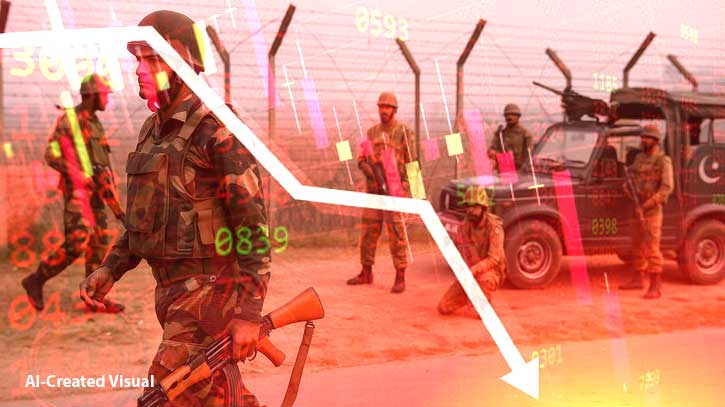The recent conflict between India and Pakistan has left both nations suffering, but India appears to have endured a significantly greater economic toll. According to various media reports, India may have suffered financial losses at least 20 times greater than Pakistan. The confrontation, which included not just border skirmishes and airstrikes but also economic and civil disruptions, has deeply affected both countries’ internal economies, investment climates, and citizens’ daily lives.
Indian media outlet Frontline reported that India’s total financial loss reached approximately $83 billion USD. A major portion of this came from the stock market, where investors withdrew around $82 billion USD within just two days, figures also cited in The Times of India. Restrictions on air travel led to daily losses of nearly $8 million USD for airline companies. Additionally, the suspension of India’s most popular tournament, the IPL (Indian Premier League), caused an estimated loss of over $50 million USD. The destruction of a Rafale fighter jet alone cost India around $400 million USD, with an added $100 million USD in increased military spending.
In contrast, Pakistan faced comparatively lower economic losses. According to ZoomBangla and The Express Tribune, Pakistan’s total loss was about $4 billion USD. The Karachi Stock Exchange saw a drop of approximately $2.5 billion USD, while air travel disruptions cost around $20 million USD. The suspension of the Pakistan Super League (PSL) led to losses of about $10 million USD, and increased defense expenditures added up to $300 million USD. However, analysts caution that despite lower absolute losses, the impact on Pakistan may be more profound due to its weaker economic infrastructure.
On the humanitarian side, the consequences were also dire. At least 66 civilians, including women and children, were reported dead in Kashmir and surrounding border areas. India claimed it conducted successful strikes on terrorist camps, allegedly killing over a hundred militants, a claim strongly denied by Pakistan. Tourism and tourism-dependent businesses in Kashmir came to a complete halt from the Pehalgam attack until the ceasefire.
Modern warfare extends far beyond the battlefield—it influences economies, technology, and humanitarian systems. This recent conflict is a stark reminder. Although the ceasefire has paused the fighting, tensions over Kashmir and unresolved political disputes persist. Should another conflict erupt, both nations risk suffering even more devastating financial consequences.

